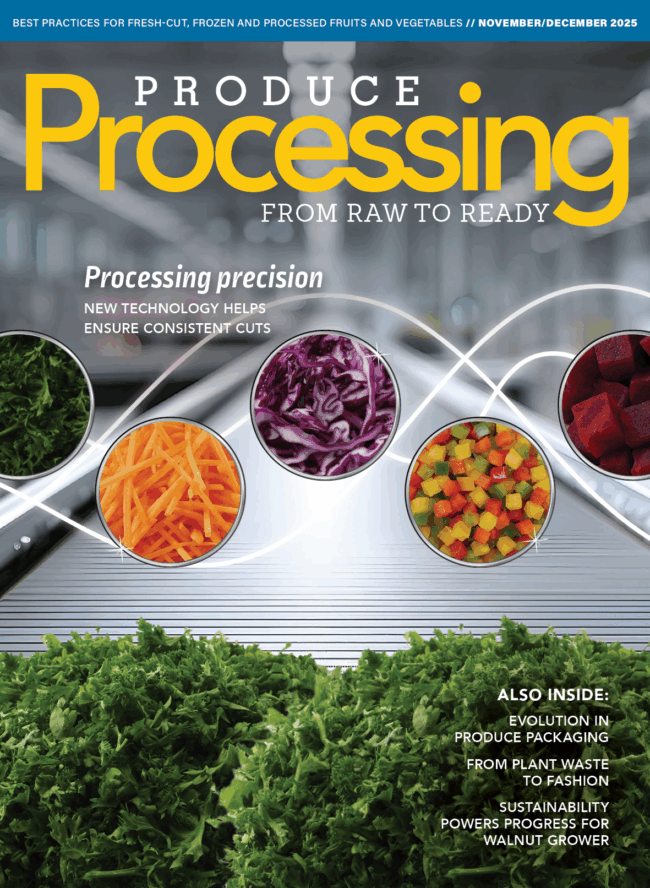Innovation impetus: Packaging advances driven by convenience, sustainability
While convenience still reigns as king, nearly all produce packaging may soon be recyclable, biodegradable or both.
Demand for fresh produce packaging is forecast to increase 2.4% per year to $7.3 billion in 2028, according to a recent report from Freedonia Group. Market value gains will be supported by modest growth in unit sales as well as by:
- Rising demand for value-added produce packaging, such as resealable trays and stand-up pouches
- The continued transition from pillow pouches to higher-value plastic trays with lidding and plastic containers for salads and leafy greens
- Increasing sales of fresh-cut produce — such as prechopped celery or ready-to-eat mixed berries — which are typically sold in tubs, cups or other higher- value containers

Plastic trays with lidding, tubs, cups and two-piece containers are expected to outperform bags and pillow pouches in retail markets due to their strong performance in applications, such as salads, berries and fresh-cut produce, despite rising concerns over the sustainability of plastic packaging.
Freedonia’s 2024 study, “U.S. Fresh Produce Packaging,” also found that paper and molded fiber alternatives have struggled to capture significant market share due to plastic’s strong protective abilities, clarity and capacity to extend shelf life.
Trends toward healthy eating have spurred increased fresh produce consumption and growth in direct-to- consumer outlets. However, consumers increasingly seek convenient ways of incorporating fresh fruits and vegetables into their busy schedules.
For example, packaged apple sales will continue to grow because of value-added applications, such as resealable stand-up pouches and large clamshells. Plus, the market for salads will be supported by the consumer preference for leafy greens and salad mixes over head lettuce. Additionally, transitioning to higher-value packaging — such as trays with resealable lidding and modified- atmosphere packaging — will boost market value.
Over the past decade, ready-to-eat and fresh-cut options have become a significant portion of the fresh produce market. These products are generally packaged in rigid plastic containers, often in a single-serving format, to support snacking and on-the-go eating.
ENVIRONMENTAL CONSCIOUSNESS INFLUENCES CHOICES
Freedonia’s research found that sustainability initiatives may favor one type of packaging over another, especially in terms of the materials used. These factors can change the volume of packaging needed and affect market value depending on their impact on the packaging product mix.
Market stability has been impacted by supply chain disruptions that have raised production costs and produced vegetables of uneven quality, according to Persistence Market Research. At the same time, consumer purchasing decisions influenced by sustainability and packaging materials are pushing frozen vegetable producers to adopt eco-friendly practices that lessen their environmental impact.
For instance, a growing number of U.S. markets and many export markets have waste disposal restrictions for packaging materials, according to North Carolina State Extension.
Examples of recent sustainable packaging applications from packaging technology organization ThePackHub’s Innovation Zone:
- Dole Food Co. expanded commercial use of Oxifilm, a 100% recyclable, macro-perforated stretch film, in its banana and pineapple operations in Latin America. The solution addresses logistical and environmental inefficiencies in the fruit supply chain by simplifying material recovery and eliminating hard-to- recycle corner boards.
- Sinclair launched the T55, a compostable label for fruits and vegetables. This label meets both home and industrial composting standards. The T55 is a price look-up (PLU) paper label that can be composted alongside fruit and vegetable peelings.
Produce processors can explore these trends and more at the premier event for the packaging and processing industry innovation, PACK EXPO Las Vegas, scheduled for Sept. 29 to Oct. 1, 2025, at the Las Vegas Convention Center.
Visit packexpolasvegas.com to learn more and register.
Jorge Izquierdo is vice president of market development for PMMI.










